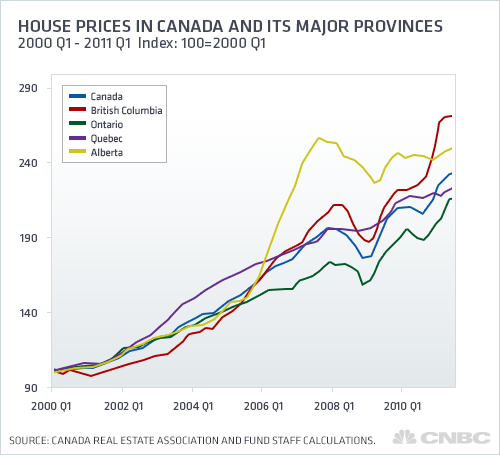Seems like hardly a week goes by now, without at least one international think tank or commentator talking about lofty-looking Canadian realty prices and the over-exposure of Canadian banks and taxpayers via the CMHC underwriting of high leverage loans. Stats on Canadian mortgage mania the past few years, are leading some to acknowledge that “maybe Canadian banks are not quite so conservative as conventional wisdom has it”. See: Is the Canadian housing market falling apart?
Not surprising really. As shown in the beside chart, price increases over the past decade have been truly epic in Canada. Experience in other countries reminds of the negative effects now likely on the great white north’s economy and other asset markets:
“While a falling housing market and subsequent wave of defaults would surely hit the income statements of Canadian banks, they may not have the same level of mortgage exposure as U.S. banks did because the government backstops so many of the mortgages. What’s more, Canada’s banking sector is so concentrated that the country would almost surely rescue any bank that did run into trouble because of mortgages.
No doubt there are hedge fund managers quietly scheming to short the housing bubble. There are Canadian REITs, for example, that would suffer in a hard landing for housing. Home builders, too. The broader Canadian stock market might suffer if home owners lose much of their wealth and find they need to sell equities to make up for the losses. The Royal Bank of Canada has a lot of uninsured mortgage exposure in the provinces that contain Vancouver and Toronto…”
“The bubble seems fairly obvious, even if it’s existence is still disputed within Canada. Canadian home prices are up nearly 100 percent since 2000. The price-to-rent ratios in major urban population centers are through the roof. In British Columbia, home prices rose 163 percent in the decade from 2001 to 2011, according to a study by the International Monetary Fund…
what we’re learning is that Canada didn’t avoid a housing bubble and financial crisis—it’s just that the Canadian crash is “on tape delay.”



